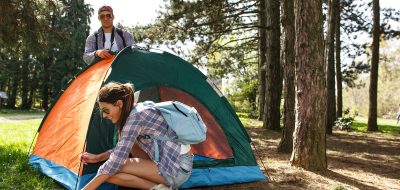Driving an RV makes some people nervous under the best conditions. Cruising along and having a tire blow out can be absolutely terrifying for many drivers as well. RV enthusiasts Russ and Tina DeMaris offer some tips on dealing with a motorhome tire blowout on NewRVer.com.
The best way to ensure against an RV tire blowing out while on the road is to take good care of your tires. This means properly maintaining your tires and replacing ones that are too worn. The DeMarises suggest checking tire pressure daily, before they have a chance to heat up from contact with the road.
If it happens despite your best intentions, how you react can dictate your success. Instead of hitting the brake right away, experts say you should accelerate slightly to keep the momentum of the RV moving forward. Keep in mind that you’ll also have to steer the vehicle pretty hard to compensate for the pull the blown tire causes on the RV. Once you have the motorhome back in control, you can start to slow down gradually to pull over and have the problem fixed.
The DeMarises also remind RVers that wearing a seatbelt is important when driving an RV at all times, especially in the case of a blowout since you’ll need to stay safely anchored to the captain’s chair to keep the situation under control.





Thomas Barber
When you are pulling a trailer there are several things to be aware of. Did you simply blow the tire or could you have lost the wheel as well.
When the tire on a trailer blows you may have extreme pull to that side of the trailer. be prepared to take evasive action. if your trailer attempts to jack knife you can be in serious trouble very quickly. your first reaction is to try and stop. THAT is the WRONG answer. If your trailer begins to jackknife that means it is moving faster than the tow vehicle. which could cause you to break traction and spin out the tow vehicle. steer away from the direction the trailer is headed, use the electric brake control and apply SLIGHT pressure to your trailer brakes. not enought to lock them up. Accelerate just enough to allow you to get everything in a straight line. then put a little more pressure on the trailer brake controller this helps slow the pressure against the tow vehicle and keep it straight. again moving to the side of the road easily and slowing down. you will greatly reduce your chances of having an accident if you can maintain a straightline of travel.
Bob L
So in my case of losing a wheel/drum(brake) assembly there is nothing written. Good Sam road service was a lost cause and could not even get me off the interstate in Birmingham, Al. at 9 pm on a Sunday night. Just had to improvise and tow on THREE tires till I found and exit and spend the night.
Monday when a low boy arrived there was still nothing they knew how to do!!!! End result was a 30 mile drive on THREE wheels with a bare spindle on the left rear. CrossRoads got a new axle and tire out in 6 weeks. SO MUCH for their warrenty program. Never did get anything/response from Good Sam road service as to why they never called for a RV repair shop to respond.
Lost the same wheel assembly again in less than a thousand miles. Never got any response from Cross Roads (30′ 5er crusier). The last time was 7 miles south on the Spanish Fort turn off from I-65 near mobile, Al. @ lane road in the middle of GOD’S country and the volenteer fire department arrived in 3 hours after one of the members drove up and asked what HE or the Department could do. Also Had a ALABAMA State trooper off duty stop and direct traffic as we could not get off the road onto the shoulder as the tire was stuck under the axle.
robert lewis
for the past 3 years i have used a digital heat reader to monitor both truck and trailer tires at each fuel stop. any tire showing a higher temperature than the others is suspect. this pro active procedure saved us a blow out in Utah when the one tire was 50 degrees higher than the others. Upon dismounting and removing the tire from the rim we discovered a large tread separation inside the tire. A disaster averted….
John Smoker
I remind RV er’s that good tread depth is not always a sign of a good tire. Severe weather cracks can also cause tire failures. A friend of mine had to tires blow on a recent trip. The tread depth was good enough to pass state inspection but on closer examination of the other tires,cracks inside the tread had developed causing the blow outs even though the trailer was stored with the tires on boards and not the ground. My own experience I had worse cracking on the inside sidewalls and not the outside sidewalls.
I suggest checking the tires closely while checking the air pressure.
Nigel Stringer
These days some RV trailer manufacturers provide the basic minimum in tires on their products. I had C rated tires, rated at 2150lbs that failed and have upgraded to 10 ply E rated tires rated at 2830 lbs. First check the load rating of your wheel, it is usually stamped on the inside of the wheel somewhere. In my example the wheel load rating was 2830lbs so I can fit a tire with a similar load rating and inflate to the maximum pressure the tire requires, in my casr 80psi. Just make sure your valve is worthy of that pressure or greater. This information was given to me by my wheel manufacturer.
I do not believe you can have too much tire on your trailer.
John Varner
It’s a tip, not a play by play of everything that is known in the world about everything that can go wrong with tires. Just a tip from someone that is trying to help others that my not have any inkling of what can happen. Newbie’s need as much info as they can get even if it’s just bits and pieces. Don’t throw someone under the bus just because some can’t see the forest for the trees. Tires are tires if someone says coach because they own one it’ll still pertain to whatever you happen to be it at any given moment if it has wheels. If someone wrote the article about a tow vehicle I’m sure nobody owing a coach would even think about it in a negative way just because they didn’t own that particular type of unit. A coach has many more ways of something that will go wrong, and most things on a coach are characteristic of any tow or live in type of vehicle. Most camper type of units don’t have a gen-set but a few do so an article on gen-sets would normally be referred to a coach but would also be info to any unit that has one. If an article comes up about another type of unit than I have I relish the info and glean what I can from it.
Liz Rickards
Again this article is about motor homes. Not very informative; does not mention pulling off the road to a safe spot, placing warning beacons or cones, what to do if no help available and you have to change the tire. Carrying the proper jack etc. Pretty obvious about the seat belts – most places its the law.
John Varner
This article pertains to towing vehicles also not just Coaches. If you want to keep an eye on what your tires are doing get yourself a tire monitoring system for you tow vehicle, and whatever you’re pulling behind it.
Jack Cameron
Always about motorhomes. What about travel trailers?
Jim Reid
And, what if the RV is a trailer – not a motorhome… any tips?
Thank you